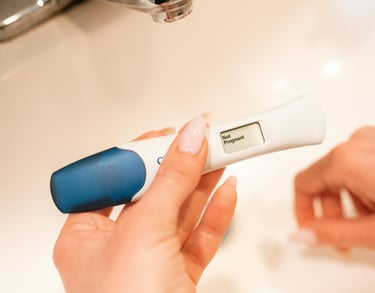Fertility


What is Fertility?
Fertility refers to the natural ability to conceive and produce offspring. In women, it involves the regular release of a healthy egg from the ovaries (ovulation), the ability of the egg to travel through the fallopian tube, and the successful implantation of a fertilized egg in the uterus. In men, it involves the production of healthy and motile sperm in sufficient numbers and their ability to fertilize an egg. Fertility is a complex process influenced by a multitude of factors related to physical health, hormonal balance, lifestyle, and age in both partners.
Why is Fertility a Growing Concern?
Fertility challenges are an increasing concern globally due to a combination of medical, social, and lifestyle factors. Medically, conditions like PCOD, endometriosis, uterine fibroids in women, and low sperm count or motility in men are becoming more prevalent or are being diagnosed more frequently. Socially, trends towards delaying parenthood due to career aspirations or financial stability mean individuals are trying to conceive at older ages when natural fertility declines. Lifestyle factors such as obesity, poor diet, stress, smoking, and excessive alcohol consumption negatively impact fertility in both men and women. Environmental factors and exposure to certain toxins are also suspected to play a role. The emotional and psychological impact of infertility on individuals and couples further contributes to its significance as a growing concern.
What Causes Fertility Issues?
Fertility issues can arise from a wide range of factors affecting either the male or female partner, or both:
In Women:
Ovulation Disorders: Conditions like PCOD, premature ovarian insufficiency (POI), and hypothalamic dysfunction can disrupt regular ovulation.
Fallopian Tube Damage or Blockage: Pelvic inflammatory disease (PID), endometriosis, or previous surgeries can damage or block the fallopian tubes, preventing the egg1 and sperm from meeting.
Uterine Issues: Fibroids, polyps, or structural abnormalities in the uterus can interfere with implantation.
Endometriosis: The growth of uterine-like tissue outside the uterus can affect the ovaries, fallopian tubes, and uterus, impacting fertility.
Age-Related Decline: A woman's fertility naturally declines with age, particularly after the mid-30s, due to a decrease in egg quality and quantity.
Hormonal Imbalances: Issues with thyroid function or other hormonal disorders can affect ovulation and fertility.
In Men:
Low Sperm Count (Oligospermia): Producing fewer sperm than normal reduces the chances of fertilization.
Poor Sperm Motility (Asthenozoospermia): Sperm that don't swim properly may not be able to reach and fertilize the egg.
Abnormal Sperm Morphology (Teratozoospermia): Sperm with an abnormal shape may have difficulty fertilizing an egg.
Varicocele: An enlargement of veins within the scrotum can affect sperm production and quality.
Ejaculation Disorders: Retrograde ejaculation or premature ejaculation can hinder sperm from reaching the egg.
Hormonal Imbalances: Low testosterone or other hormonal issues can affect sperm production.
Genetic Factors: Certain genetic conditions can impact male fertility.
Lifestyle Factors: Smoking, excessive alcohol, drug use, and obesity can negatively affect sperm health.
How to Start Reversing Fertility Issues Naturally?
While not all causes of infertility can be reversed naturally, adopting a healthy lifestyle and addressing modifiable factors can significantly improve fertility in many individuals and couples. Key natural strategies include:
Adopting a Nutrient-Dense Diet: Consuming a balanced diet rich in fruits, vegetables, whole grains, lean protein, and healthy fats provides essential nutrients that support2 hormonal balance and reproductive health in both men and women. Ensuring adequate intake of folate, zinc, vitamin D, and antioxidants is particularly important for fertility.
Achieving and Maintaining a Healthy Weight: Being overweight or underweight can disrupt hormonal balance and ovulation in women and affect sperm quality in men. Aiming for a healthy Body Mass Index (BMI) is crucial for optimizing fertility.
Regular Exercise: Moderate regular exercise can improve overall health, reduce stress, and support hormonal balance. However, excessive strenuous exercise can sometimes negatively impact fertility, especially in women.
Stress Management: Chronic stress can interfere with ovulation and sperm production. Practicing stress-reducing techniques like yoga, meditation, and mindfulness can be beneficial for fertility.
Prioritizing Sleep: Adequate and quality sleep is essential for hormonal regulation and overall reproductive health in both men and women.
Limiting Exposure to Toxins: Reducing exposure to environmental toxins, such as pesticides and certain chemicals, and avoiding smoking and excessive alcohol consumption can improve fertility.
Timing Intercourse: Understanding the woman's menstrual cycle and having regular intercourse during the fertile window (around ovulation) increases the chances of conception.
It is crucial for individuals and couples facing fertility challenges to seek guidance from healthcare professionals, including fertility specialists. Natural strategies can often complement medical interventions and play a supportive role in improving fertility outcomes.
What Makes Nutri Guard Different for Fertility?
Nutri Guard offers a specialized approach to supporting fertility by focusing on:
Personalized Nutrition Plans for Reproductive Health: Developing tailored dietary plans that address specific nutritional deficiencies and hormonal imbalances that can impact fertility in both men and women. This includes optimizing micronutrient intake crucial for egg and sperm health, ovulation, and implantation.
Holistic Lifestyle Optimization for Conception: Providing comprehensive guidance that integrates diet, exercise recommendations tailored for fertility, stress management techniques, and sleep hygiene strategies to create an optimal environment for conception.
Addressing Underlying Conditions: Developing nutritional and lifestyle strategies to manage underlying conditions like PCOD, insulin resistance, and thyroid imbalances that can negatively affect fertility.
Nutritional Support for Assisted Reproductive Technologies (ART): Offering guidance on how nutrition can complement and potentially improve the outcomes of treatments like IVF or IUI.
Preconception Care for Both Partners: Emphasizing the importance of optimizing the health of both the male and female partner through nutrition and lifestyle modifications before attempting conception.
Expert Guidance and Support: Providing ongoing support from qualified nutritionists and wellness professionals who understand the intricate relationship between nutrition, lifestyle, and fertility, offering personalized strategies and encouragement throughout the journey.

